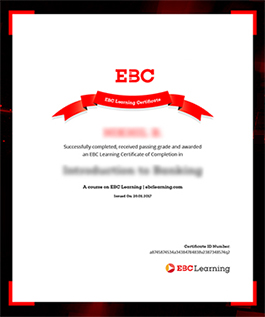Contract Drafting Essentials
Master the essential skills of contract drafting with EBC Learning's introductory self-paced course. Learn from the comfort of your own home and gain the expertise to confidently draft key business agreements. This course has been meticulously crafted by seasoned industry leaders, ensuring that you gain access to specific, practical insights tailored to real-world scenarios.
Why Take This Course?
- Draft with Confidence: Learn the fundamentals of drafting essential agreements like partnership agreements, LLP agreements, and shareholders' agreements.
- Mastering Important Clauses: Learn all the essential aspects of contract such as introductory clauses, performance related clauses, definitions, interpretations and disputes resolutions clauses, confidentiality, etc.
- Complete Contract Drafting Process: Hands on approach to contract drafting, right from pre-contractual instruments to review and revision process.
- Utilise MS Word: Learn how to utilise MS Word's track/redline mode for efficient collaboration and editing.
- Career Advancement: Open doors to exciting opportunities in corporate law and transactional practice.
Who Should Take This Course?
- Law Students & Graduates: Launch your legal career with a strong foundation in Contract Drafting.
- Law Professionals: Enhance your skill set and become a valuable asset in corporate law practice.
- Business Professionals: Gain the legal knowledge to confidently negotiate and review contracts.
- Entrepreneurs: Learn how to craft effective contracts to protect your business interests.
Course Structure
Engaging and Structured Videos: Learn at your own pace with our expertly crafted video lectures delivered by leading industry professionals. Whether you are exploring a new area of law or reinforcing your existing expertise, the series of short videos (around 2-3 minutes each) empower you to learn at your own pace, revisiting concepts as needed. Each video segment is thoughtfully crafted to explain the practical applications and processes related to the specific Definition, Concept, Explanation, Section, or Article being covered.
Practical Assignments and Solutions: Solidify your knowledge with practical exercises that put theory into action. Wherever required, practical assignments are explained in detail through ‘Solutions Videos’ or ‘Solutions Guide’, wherein our experts walk you through each and every step for solving the practical legal problems either through Videos or a documentary guide.
Q&A for Knowledge Mastery: Test your understanding and gain clarity through Multiple Choice Questions (MCQs) at the end of chapters. These MCQs test your comprehension and application of mind ensuring you have the right understanding of the course material.
Don't just understand contracts, learn to draft them like a pro! Enroll today and unlock your full potential as a contract drafter!
- 1. 📕 Introduction
- 1.1 ▸ Welcome
- 2. 📕 Drafting Agreements: The Prelude
- 2.1 ▸ Purposes of contract law
- 2.2 ▸ Why draft agreements?
- 2.3 ▸ Default and mandatory rules
- 2.4 ▸ Incomplete contracts
- 2.5 ▸ Vagueness and ambiguity
- 2.6 ▸ Transaction costs
- ☆ Feedback
- 3. 📕 Language and Style in Contract Drafting
- 3.1 ▸ Using correct language
- 3.2 ▸ Using punctuation
- 3.3 ▸ Keeping in mind grammar and style
- 3.4 ▸ Using active voice
- 4. 📕 Pre-contractual Instruments
- 4.1 ▸ What is a pre-contractual instrument?
- 4.2 ▸ Term sheet
- 4.3 ▸ Letter of intent
- 4.4 ▸ Letter of award
- 4.5 ▸ Memorandum of understanding
- 5. 📕 Introductory Parts of an Agreement
- 5.1 ▸ Introductory parts of an agreement
- 5.2 ▸ Title of the agreement
- 5.3 ▸ Date of the agreement
- 5.4 ▸ Place of execution
- 5.5 ▸ Recitals
- 6. 📕 Definitions, Interpretation and Other Clauses
- 6.1 ▸ Introducing the definition clause
- 6.2 ▸ Interpretation clause
- 6.3 ▸ Conflicts provision
- 6.4 ▸ Entire agreement clause
- 6.5 ▸ Severability clause
- 6.6 ▸ No oral modification clause
- 6.7 ▸ No waiver clause
- 7. 📕 Performance
- 7.1 ▸ Performance related clauses
- 7.2 ▸ Performance related clauses and obligations
- 7.3 ▸ Technical standards and specifications
- 8. 📕 Other Clauses
- 8.1 ▸ Representations and warranties
- 8.2 ▸ Time as essence
- 8.3 ▸ Contract closing
- 8.4 ▸ Force majeure clause
- 8.5 ▸ Intellectual property rights clauses
- 8.6 ▸ Assignment clause
- 9. 📕 Remedies for Contractual Breaches
- 9.1 ▸ Contractual breach
- 9.2 ▸ Suspension clause
- 9.3 ▸ Termination clause
- 10. 📕 Specific Performance and Other Remedies
- 10.1 ▸ Specific performance
- 10.2 ▸ Substituted performance or risk and cost contracting
- 10.3 ▸ Contractual set-off
- 11. 📕 Price, Payment, Taxes and Duties
- 11.1 ▸ Price clause
- 11.2 ▸ Time of payment, payment milestone and mode of payment
- 11.3 ▸ Escrow arrangement
- 11.4 ▸ Currency clause
- 11.5 ▸ Taxes and duties clause
- 12. 📕 Confidentiality Agreements and Clauses
- 12.1 ▸ Importance of confidentiality clause or agreement
- 12.2 ▸ Contents and parties to a confidentiality clause
- 13. 📕 Dispute Resolution Clauses
- 13.1 ▸ Dispute resolution clause
- 13.2 ▸ Dispute resolution by arbitration and expert determination
- 13.3 ▸ Pathological arbitration clauses
- 13.4 ▸ Avoiding pathological arbitration clauses
- 13.5 ▸ Expert determination or valuation
- 14. 📕 International Agreements
- 14.1 ▸ Challenges faced in international agreements
- 14.2 ▸ Choice of law clause
- 14.3 ▸ Notice clause
- 14.4 ▸ Language clause
- 15. 📕 Some Common Agreements - I
- 15.1 ▸ Introduction
- 15.2 ▸ Bank guarantees
- 15.3 ▸ Function of bank guarantees
- 15.4 ▸ Conditional and unconditional bank guarantees
- 15.5 ▸ Structure of unconditional bank guarantees
- 15.6 ▸ Corporate guarantees
- 15.7 ▸ Indemnity bonds
- 16. 📕 Some Common Agreements - II
- 16.1 ▸ Introduction
- 16.2 ▸ Gift deeds
- 16.3 ▸ Lease deeds
- 16.4 ▸ Licence agreements
- 16.5 ▸ Sale deeds
- 16.6 ▸ Employment agreement
- 17. 📕 Conclusion
- 17.1 ▸ Conclusion
- ☆ Feedback
- ✍️ Assignment: Contract Drafting
- 1. ✍️ Assignment
- ✅ Solution: Contract Drafting—Arbitration Clause
- 2. ✍️ Assignment
- ✅ Solution: Contract Drafting—Liquidated Damages
- Live Class & Recording: Contract Drafting Essentials (Sat 25 May 2024, 05:00 PM) 🔴
- ⚑ Live Class
- ⦿ Live Class - Recording
Instructors

Badrinath Srinivasan
Senior Manager (Legal), Directorate General of Hydrocarbons under MOPNG
Badrinath Srinivasan has over 15 years experience in contract-related issues and handling high-stakes international arbitrations and litigations in the petroleum exploration and production sector.
Certificate
Complete this course and exercises to earn a certificate. Share it with your friends, colleagues, and employers.*
*You must Subscribe to get a certificate.

Limit Reached or Trial Expired
You have reached the limit of 2 audit enrollments or your trial period has expired.

